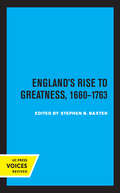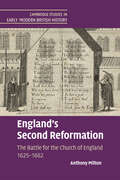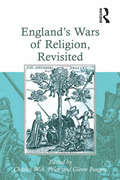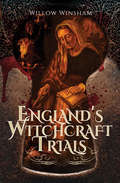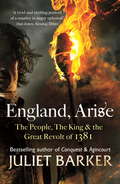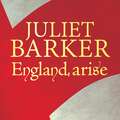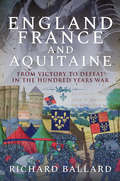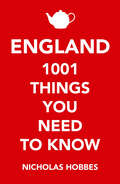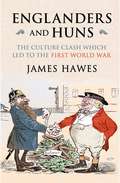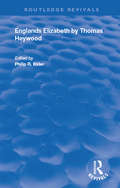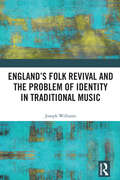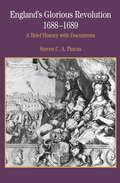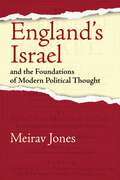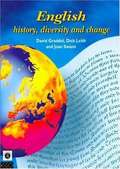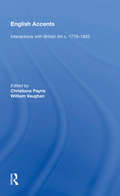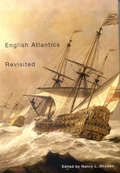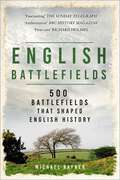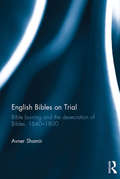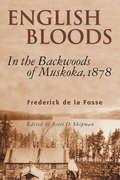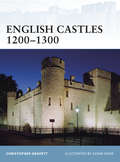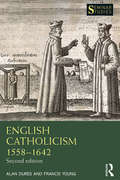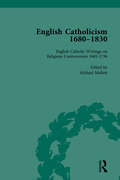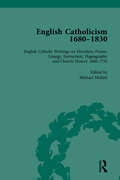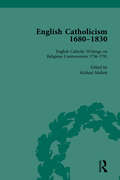- Table View
- List View
England's Rise to Greatness, 1660-1763 (Clark Library Professorship, UCLA #7)
by Stephen B. BaxterIn 1660 England was already prosperous, free, civilized, and the possessor of the makings of an empire. In the century to follow, the island nation became the world's greatest power. This cohesive collection of essays on a wide range of topics illuminates important facets of the political history of England from the Restoration to the American War of Independence. Arthur J. Slavin of the university of Louisville discusses and important problem in legal history in his "Craw v. Ramsey: New light on an Old Debate." Jacob M. Price of the University of Michigan takes another look at the Excise Crisis. Ragnhild M. Hatton of the London School of Economics sheds new light on George I. Daniel A. Baugh of Cornell University considers "pauperism, Protestantism, and Political Economy: English Attitudes toward the Poor 1660 - 1800." Anglo-Savoyard relations are the topic of Geoffrey Symocox of the University of California, Los Angeles. The late Arthur M. Wilson of Dartmouth is represented by a wise and charming paper entitled "The Enlightenment Came First to England." Lois G. Schwoerer of George Washington University finds new perspectives while examining the Glorious Revolution. John Brewer of Harvard explains "the Number 45: A Wilkite Political Symbol." Clayton Roberts of the Ohio State University discusses "Party and the Patronage in Later Stuart England," while Stephen Baxter of the University of North Carolina takes up some aspects of the conduct of the Seven Years War. All of the contributions were originally delivered at the Wiliam Andrews Clark Memorial Library during Stephen Baxter's tenure as Clark Library Professor in 1977 - 1978. Each of the essays will appeal to a learned audience of specialists, and the variety of topics will interest the general reader. This collection represents the leading scholarship on this remarkable period of English history. This title is part of UC Press's Voices Revived program, which commemorates University of California Press's mission to seek out and cultivate the brightest minds and give them voice, reach, and impact. Drawing on a backlist dating to 1893, Voices Revived makes high-quality, peer-reviewed scholarship accessible once again using print-on-demand technology. This title was originally published in 1983.
England's Second Reformation: The Battle for the Church of England 1625–1662 (Cambridge Studies in Early Modern British History)
by Anthony MiltonEngland's Second Reformation reassesses the religious upheavals of mid-seventeenth-century England, situating them within the broader history of the Church of England and its earlier Reformations. Rather than seeing the Civil War years as a destructive aberration, Anthony Milton demonstrates how they were integral to (and indeed the climax of) the Church of England's early history. All religious groups – parliamentarian and royalist alike – envisaged changes to the pre-war church, and all were forced to adapt their religious ideas and practices in response to the tumultuous events. Similarly, all saw themselves and their preferred reforms as standing in continuity with the Church's earlier history. By viewing this as a revolutionary 'second Reformation', which necessarily involved everyone and forced them to reconsider what the established church was and how its past should be understood, Milton presents a compelling case for rethinking England's religious history.
England's Wars of Religion, Revisited
by Glenn BurgessThe causes and nature of the civil wars that gripped the British Isles in the mid-seventeenth century remain one of the most studied yet least understood historical conundrums. Religion, politics, economics and affairs local, national and international, all collided to fuel a conflict that has posed difficult questions both for contemporaries and later historians. Were the events of the 1640s and 50s the first stirrings of modern political consciousness, or, as John Morrill suggested, wars of religion? This collection revisits the debate with a series of essays which explore the implications of John Morrill's suggestion that the English Civil War should be regarded as a war of religion. This process of reflection constitutes the central theme, and the collection as a whole seeks to address the shortcomings of what have come to be the dominant interpretations of the civil wars, especially those that see them as secular phenomena, waged in order to destroy monarchy and religion at a stroke. Instead, a number of chapters present a portrait of political thought that is defined by a closer integration of secular and religious law and addresses problems arising from the clash of confessional and political loyalties. In so doing the volume underlines the extent to which the dispute over the constitution took place within a political culture comprised of many elements of fundamental agreement, and this perspective offers a richer and more nuanced readings of some of the period's central figures, and draws firmer links between the crisis at the centre and its manifestation in the localities.
England's Witchcraft Trials
by Willow WinshamBy the author of Accused comes “an entertaining as well as illuminating” history of Britain’s most infamous witch hunts and trials (Magnolia Review). With the echo of that chilling injunction, “Thou shalt not suffer a witch to live,” hundreds of people were accused and tried for witchcraft across England throughout the sixteenth and seventeenth centuries. With fear and suspicion rife, neighbor turned against neighbor, friend against friend, as women, men, and children alike were caught up in the deadly fervor that swept through villages. From the feared covens of Pendle Forest to the victims of the notorious and fanatical Witchfinder Generals Matthew Hopkins and John Stearns, so-called witches were suspected, accused, and dragged to trial to await judgement and face their inevitable and damnable fate. In this “interesting, informative and insightful” book, historian Willow Winsham draws on a wealth of primary sources including trial transcripts, parish, and country records, and the often sensational—and highly prejudicial—pamphlets that were published after each trial. Her exhaustive research reveals just how frightening, violent, and terribly common the scourge really was, and explores the social conditions, class divisions, and religious mania that stoked its flames (All About History).
England, Arise: The People, the King and the Great Revolt of 1381
by Juliet BarkerThe dramatic and shocking events of the Peasants' Revolt of 1381 are to be the backdrop to Juliet Barker's latest book: a snapshot of what everyday life was like for ordinary people living in the middle ages. The same highly successful techniques she deployed inAgincourt and Conquest will this time be brought to bear on civilian society, from the humblest serf forced to provide slave-labour for his master in the fields, to the prosperous country goodwife brewing, cooking and spinning her distaff and the ambitious burgess expanding his business and his mental horizons in the town.The book will explore how and why such a diverse and unlikely group of ordinary men and women from every corner of England united in armed rebellion against church and state to demand a radical political agenda which, had it been implemented, would have fundamentally transformed English society and anticipated the French Revolution by four hundred years. The book will not only provide an important reassessment of the revolt itself but will also be an illuminating and original study of English medieval life at the time.
England, Arise: The People, the King and the Great Revolt of 1381
by Juliet BarkerThe dramatic and shocking events of the Peasants' Revolt of 1381 are to be the backdrop to Juliet Barker's latest book: a snapshot of what everyday life was like for ordinary people living in the middle ages. The same highly successful techniques she deployed in Agincourt and Conquest will this time be brought to bear on civilian society, from the humblest serf forced to provide slave-labour for his master in the fields, to the prosperous country goodwife brewing, cooking and spinning her distaff and the ambitious burgess expanding his business and his mental horizons in the town.The book will explore how and why such a diverse and unlikely group of ordinary men and women from every corner of England united in armed rebellion against church and state to demand a radical political agenda which, had it been implemented, would have fundamentally transformed English society and anticipated the French Revolution by four hundred years. The book will not only provide an important reassessment of the revolt itself but will also be an illuminating and original study of English medieval life at the time.
England, France and Aquitaine: From Victory to Defeat in the Hundred Years War
by Richard BallardThe author of The Unseen Terror “looks at the fortunes of Richard II and Charles VI of France in a fascinating account of that war” (Books Monthly).This is a narrative history of England and France during the Hundred Years War, from the triumphs of Henry V to the defeat of the English and loss of Gascony and Bordeaux—a huge blow to English prestige and economic interest. This is a military history with technical detail, linked to high politics, courtly intrigue, dynastic ambition, economic interest (wine trade and Bordeaux). The story revolves around the death of two Kings, Henry V of England, soon after his military triumphs, and Charles VI of France, in 1422. Both had historic claims to the “French fiefs.” Henry was succeeded by Richard II, and Charles was succeeded by Charles VII. The contrast could hardly have been greater between Richard, a diffident, scholarly and religious figure, in an age when kings were expected to be aggressive leaders and military commanders; and Charles—an able politician, soldier and, in modern parlance, a “hard man,” who embodied the 15th century concept of kingship. Intermittent but constant warfare continued until English defeat in 1476 and the loss of Gascony and Bordeaux, and the Peace of Picquigny brought to an end a decisive episode in the Hundred Years War, foreshadowing England’s future total withdrawal from France.“An entertaining and informative review of the conflict and the factors leading up to the loss of Gascony and Bordeaux.” —Firetrench“[Ballard] teases apart the very tangled web of alliances, treaties, and double-dealing in a very clear concise and easy to follow way.” —Army Rumour Service (ARRSE)
England: 1001 Things You Need to Know
by Nicholas HobbesDespite a thousand years of glorious history, many people know surprisingly little of the facts and fables, people and places and events and emblems that have shaped England and its heritage. Where did John Bull come from? What is the Long Man of Wilmington? Who abolished Christmas? When did roast beef become a national dish? From the White Cliffs of Dover to MG Rover, from Newcastle Brown Ale to Royal Mail, and from John Milton to blue stilton, Nicholas Hobbes explains and celebrates the many facets of Englishness for today's readers. The result is as entertaining as it is essential.
Englanders and Huns
by James HawesA completely fresh look at the enmity between Britain and Germany that all but destroyed Europe.Half a century before 1914, most Britons saw the Germans as poor and rather comical cousins - and most Germans looked up to the British as their natural mentors. Over the next five decades, each came to think that the other simply had to be confronted - in Europe, in Africa, in the Pacific and at last in the deadly race to cover the North Sea with dreadnoughts.But why? Why did so many Britons come to see in Germany everything that was fearful and abhorrent? Why did so many Germans come to see any German who called dobbel fohlt while playing Das Lawn Tennis as the dupe of a global conspiracy?Packed with long-forgotten stories such as the murder of Queen Victoria's cook in Bohn, the disaster to Germany's ironclads under the White Cliffs, bizarre early colonial clashes and the precise, dark moment when Anglophobia begat modern anti-Semitism, this is the fifty-year saga of the tragic, and often tragicomic, delusions and miscalculations that led to the defining cataclysm of our times - the breaking of empires and the womb of horrors, the Great War. Richly illustrated with the words and pictures that formed our ancestors' disastrous opinions, it will forever change the telling of this fateful tale.
Englands Elizabeth (Routledge Revivals)
by Thomas HeywoodPublished in 1982: England’s Elizabeth was first issues in 1631, and it is probably the earliest separately published biography of Elizabeth I’s early years. An important example of the author’s considerable, and largely neglected, non-dramatic work, the book has never been previously edited.
England’s Folk Revival and the Problem of Identity in Traditional Music
by Joseph WilliamsEstablishing an intersection between the fields of traditional music studies, English folk music history and the philosophy of Gilles Deleuze and Félix Guattari, this book responds to the problematic emphasis on cultural identity in the way traditional music is understood and valued. Williams locates the roots of contemporary definitions of traditional music, including UNESCO-designated intangible cultural heritage, in the theory of English folk music developed in 1907 by Cecil Sharp. Through a combination of Deleuzian philosophical analysis and historical revision of England’s folk revival of the Victorian and Edwardian eras, Williams makes a compelling argument that identity is a restrictive ideology that runs counter to the material processes of traditional music’s production. Williams reimagines Sharp’s appropriation of Darwinian evolutionary concepts, asking what it would mean today to say that traditional music ‘evolves’, in light of recent advances in evolutionary theory. The book ultimately advances a concept of traditional music that eschews the term’s long-standing ontological and axiological foundations in the principle of identity. For scholars and graduate students in musicology, cultural studies, and ethnomusicology, the book is an ambitious and provocative challenge to entrenched habits of thought in the study of traditional music and the historiography of England’s folk revival.
England’s Glorious Revolution, 1688–1689: A Brief History With Documents (Bedford Cultural Editions)
by Steven C. A. PincusEngland's Glorious Revolution is a fresh and engaging examination of the Revolution of 1688–1689, when the English people rose up and deposed King James II, placing William III and Mary II on the throne. Steven Pincus's introduction explains the context of the revolution, why these events were so stunning to contemporaries, and how the profound changes in political, economic, and foreign policies that ensued make it the first modern revolution. This volume offers 40 documents from a wide array of sources and perspectives including memoirs, letters, diary entries, political tracts, pamphlets, and newspaper accounts, many of which are not widely available. Document headnotes, questions for consideration, a chronology, a selected bibliography, and an index provide further pedagogical support.
England’s Israel and the Foundations of Modern Political Thought (Jewish Culture and Contexts)
by Meirav JonesThe foundations of modern political thought, presumed secular, were laid in conversation with theologically motivated politics and in negotiation with Jewish ideasMid-seventeenth-century England was a hotbed in which crucial ideas of modern politics were conceived: Thomas Hobbes presented his social contract; John Selden wrote major treatises which were foundational for modern natural and international law; and England participated in the wave of republicanism that swept over Europe. This was also the period of the English Civil War—which has been portrayed as a “war of religion” and a “revolution of saints”—and was characterized by religious ends and motivations guiding politics and politicians.In England’s Israel and the Foundations of Modern Political Thought, Meirav Jones proposes that the foundational political theory conceived in this period was significantly related to the theological politics of the time. Through an examination of the language and imagery shared by theorists and saints, Jones finds that, in the twenty-year period between 1640 and1660, when Hobbes, Selden, and their contemporaries published, over 40 percent of all texts published in England contained one or more of the terms “Hebrew,” “Israel,” “Jerusalem,” “Zion,” or “Jew.” Further, all known works of political theory from the period employed these terms. While preachers in English parliament addressed and understood England as “Israel,” foundational theorists of the modern state employed ancient Israel as a political model and explicitly preferred Hebrew over Greek wisdom.Modern politics did not develop solely from within a conversation among elites, neither was it conceived as a Godless enterprise, even by its most renowned secular architects. Instead, as the book demonstrates, it spoke the language of religiously motivated politics and was conceived in its terms. Ultimately, Jones argues that it was through a sweeping revival of Hebrew in early modern Europe that the foundations of modern politics were laid in conversation with theological politics and in negotiation with Jewish ideas and ideas of the Jews.
English Accents: Interactions with British Art c. 1776-1855 (British Art And Visual Culture Since 1750 New Readings Ser.)
by Christiana PayneIn the century following the foundation of the Royal Academy in 1768, British art had an international reputation: prints spread knowledge of the work of British artists around the globe, and it was widely seen as the product of a modern, commercial society, and much admired by artists as diverse as Goya in Spain, Delacroix in France, and Bierstadt in America. In recent years, scholars working on this period have become increasingly aware of the international context of their subject, but there has been no systematic analysis of the reception of British art abroad. This collection of essays looks at the uses made of the paintings of Reynolds, Hogarth, Lawrence and their contemporaries on the continent of Europe, and in the colonies and ex-colonies of Australia and America. The authors go beyond the simple issue of 'influence' to consider how ideas and artistic conventions originating in the British Isles were adapted, appropriated or resisted in these new environments. In the process, some surprising views of British art emerge, demonstrating how a multi-faceted view from the outside can correct and enrich the narrative produced within a national school, and revealing some of the important connections that are obscured when art is studied, as it so often is, within narrow national boundaries.
English Atlantics Revisited
by Nancy L. RhodenInspired by the major themes in Steele's scholarship, the original essays in English Atlantics Revisited examine British Atlantic contexts and political economy, as well as maritime, military, Amerindian, and social history. The contributors offer challenging new findings and perspectives as they revisit the English Atlantics: chapters on specific personalities, regions, and topics reveal the extent of transatlantic, cross-cultural, and trans-national interactions. English Atlantics Revisited help assess the current state of Atlantic history.
English Atlantics Revisited: Essays Honouring Ian K. Steele
by Nancy L. RhodenInspired by the major themes in Steele's scholarship, the original essays in English Atlantics Revisited examine British Atlantic contexts and political economy, as well as maritime, military, Amerindian, and social history. The contributors offer challenging new findings and perspectives as they revisit the English Atlantics: chapters on specific personalities, regions, and topics reveal the extent of transatlantic, cross-cultural, and trans-national interactions. English Atlantics Revisited help assess the current state of Atlantic history.
English Battlefields: 500 Battlefields That Shaped English History
by Michael Rayner'Fascinating' - The Sunday TelegraphEngland has been fought over for centuries, by invaders and in civil wars. The sites of these desperate struggles are as varied as the reasons they were fought over, be they fields, towns or fortresses, by land, sea or air. These haunted acres are places of commemoration, memory and, above all, history. These are the places where history was made, and as such they form a crucial part of the historic environment. By 'reading' them like any other form of historical evidence, much can be learned about the events which took place there. Through stripping away later features and land use with an eye for the ground, the battlefield historian can, with the use of contemporary accounts, archaeology and military history, reconstruct the events which have shaped the present. In this ground-breaking volume, covering over 500 battlefields, Michael Rayner unravels these various strands and weaves them back together to give clear, concise accounts of the battles which shaped England.
English Bibles on Trial: Bible burning and the desecration of Bibles, 1640–1800
by Avner ShamirThe aim of this book is to explore antagonism towards, and acts of violence against, English Bibles in England and Scotland (and, to a lesser degree, Ireland) from the English Civil War to the end of the eighteenth century. In this period, English Bibles were burnt, torn apart, thrown away and desecrated in theatrical and highly offensive ways. Soldiers and rebels, clergymen and laymen, believers and doubters expressed their views and emotions regarding the English Bible (or a particular English Bible) through violent gestures. Often, Bibles of other people and other denominations were burnt and desecrated; sometimes people burnt and destroyed their own Bibles. By focusing on violent gestures which expressed resentment, rejection and hatred, this book furthers our understanding of what the Bible meant for early modern Christians. More specifically, it suggests that religious identities in this period were not formed simply by the pious reading, study and contemplation of Scripture, but also through antagonistic encounters with both Scripture itself and the Bible as a material object.
English Bloods: In the Backwoods of Muskoka, 1878
by Frederick de la Fosse Scott D. ShipmanFarming in the Canadian backwoods in the late 1800s was a prospect that enticed many young Englishmen to cross the Atlantic. One such fellow was Frederick de la Fosse, whose well-meaning uncle paid £100 per annum for his young nephew to serve as a farm pupil in the northern reaches of Muskoka. Some years later, de la Fosse, under the pseudonym of Roger Vardon, wrote an illuminating and humorous biographical account of the trials and tribulations of the "English Bloods," the local epithet attached to these young lads attempting to hone farming skills in a land never intended to be agricultural. And, in so doing, de la Fosse chronicles the realities of pioneer life in the area.In the original text, published in 1930, a number of names were changed to conceal identities of the local people. Editor Scott D. Shipman has spent over eight years researching the authentic names and overall background for this new augmented edition of English Bloods. The richly descriptive text written by the keenly observant and erudite de la Fosse is complemented by archival visuals and annotations for today’s reader.Frederick de la Fosse went on to become a public librarian in Peterborough in 1910.
English Castles 1200-1300
by Adam Hook Christopher GravettThe simple castles raised after the Norman conquest had been developed throughout 11th and 12th centuries, whilst the introduction of Islamic and Byzantine fortification techniques from the late 12th century led to further developments in castle architecture. These fortifications were to be well tested throughout the course of the 13th century as England was riven by the conflict, characterized by prolonged sieges, between the monarchy and powerful magnates. As well as providing the focus for warfare, castles increasingly became the centres of their communities, providing a more permanent base for the lord, his family and retainers, as well as acting as centres for justice and administration.
English Catholicism 1558–1642 (Seminar Studies)
by Francis Young Alan DuresNewly revised and updated, the second edition of English Catholicism 1558–1642 explores the position of Catholics in early modern English society, their political significance, and the internal politics of the Catholic community. The Elizabethan religious settlement of 1559 ostensibly outlawed Catholicism in England, while subsequent events such as the papal excommunication of Elizabeth I, the Spanish Armada, and the Gunpowder Plot led to draconian penalties and persecution. The problem of Catholicism preoccupied every English government between Elizabeth I and Charles I, even if the numbers of Catholics remained small. Nevertheless, a Catholic community not only survived in early modern England but also exerted a surprising degree of influence. Amid intense persecution, expressions of Catholicism ranged from those who refused outright to attend the parish church (recusants) to ‘church papists’ who remained Catholics at heart. English Catholicism 1558–1642 shows that, against all odds, Catholics remained an influential and historically significant minority of religious dissenters in early modern England. Co-authored with Francis Young, this volume has been updated to include recent developments in the historiography of English Catholicism. It is a useful introduction for all undergraduate students interested in the English Reformation and early modern English history.
English Catholicism, 1680-1830, vol 1
by Michael MullettOffers a collection of English-language Catholic literature covering the long eighteenth century. This book focuses on the periods of martyrdom and violent persecution from the end of the sixteenth to the end of the seventeenth centuries and, latterly, on the so-called 'Second Spring' of English Catholicism.
English Catholicism, 1680-1830, vol 2
by Michael MullettOffers a collection of English-language Catholic literature covering the long eighteenth century. This book focuses on the periods of martyrdom and violent persecution from the end of the sixteenth to the end of the seventeenth centuries and, latterly, on the so-called 'Second Spring' of English Catholicism.
English Catholicism, 1680-1830, vol 3
by Michael MullettOffers a collection of English-language Catholic literature covering the long eighteenth century. This book focuses on the periods of martyrdom and violent persecution from the end of the sixteenth to the end of the seventeenth centuries and, latterly, on the so-called 'Second Spring' of English Catholicism.
